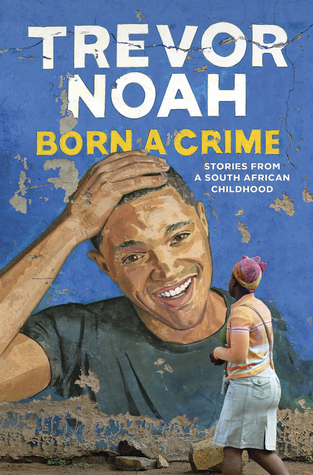 Title: Born a Crime: Stories From a South African Childhood
Title: Born a Crime: Stories From a South African Childhood
Writer: Trevor Noah
Publisher: Audible Studios (15 November 2016)
Duration: 8 hours 44 minutes
ASIN: B01IW9TQPK
Rating: 5 dari 5 ⭐ – it was amazing
I rarely read a biography. It never seems appealing to me. You can browse my Goodreads read bookshelves and check how many biography or memoir books I have read until now. You won’t find many, I’m sure. I thought, what was so exciting reading about someone else’s (mainly famous people’s) life? A biography was not my cup of tea until I watched Trevor Noah’s stand-up comedy performances on Netflix last weekend.
I knew Trevor had written something, a book I had forgotten the title of. I saw one of my Goodreads friends review it. I wasn’t interested at that time. Watching his performances made me curious about his book. Would his book be as good as his performances on stage when he cracks jokes about racism, sexism, and other social issues?
So, I listened to Born a Crime audiobook edition, which Trevor himself narrated. Before I continue, I just wanted to tell you that this is the first time I have subscribed to Audible out of curiosity. Oh, boy, I was delighted with it.
Let’s get back to the book.
Born a Crime was about Trevor’s life in South Africa, where he was born and raised. Growing up in South Africa was tough. Not only do you face poverty, but also apartheid, which according to Wikipedia, is a system of institutionalized racial segregation. Racism isn’t logical. It doesn’t make any sense. You classify and treat a human being based on the color of their skin? It’s wicked.
Trevor wrote that by being born as if he was destined for a crime because of his skin color.
The doctors took her up to the delivery room, cut open her belly, and reached in and pulled out a half-white, half-black child who violated any number of laws, statutes, and regulations—I was born a crime.
Trevor writes in eloquent and funny ways. A few times, I chuckled, while other times, I laughed so hard listening to him narrating this book. It’s no wonder, though, because he’s a comedian. Of course, he writes in a funny tone.
Trevor had lived a rich life with experiences. As a person whose life is flat and dull, I envy Trevor. That doesn’t mean I want to experience poverty and racism firsthand, but to look at it now, Trevor survives, writes about it, and makes jokes about it; it just seems that Trevor’s life has been excellent. He’s also so cool because he fought so hard to get the life he has now.
We must credit Patricia Noah — Trevor’s mom — for raising her son well to be a man. Patricia was progressive for women at that time in South Africa. Yes, she gave Trevor tough love, but she also gave Trevor things that she didn’t have back when she was a kid. From this book, I can tell that Trevor loves his mother very much. Trevor also wrote about his father; his puppy loves back in his teenage years, his petty crimes (making and selling pirated CDs), his first dog, and many more.
I learned much from him, especially about life during apartheid and post-apartheid in South Africa. In chapter 15, I found out that people in South Africa could name their children Hitler without knowing who Hitler was. To South Africans, Hitler was not the most horrible person because to them, or to other nations, there were people who were more vicious than Hitler. The difference was Nazis had documented their atrocities well, so Holocaust is more well-known than any other genocides or atrocities that ever happened.
This book has many beautiful words and thoughtful meanings, making me want to quote them all. Here are some of them:
“People love to say, “Give a man a fish, and he’ll eat for a day. Teach a man to fish, and he’ll eat for a lifetime.” What they don’t say is, “And it would be nice if you gave him a fishing rod.” That’s the part of the analogy that’s missing.”
“We tell people to follow their dreams, but you can only dream of what you can imagine, and, depending on where you come from, your imagination can be quite limited.”
“If you’re Native American and you pray to the wolves, you’re a savage. If you’re African and you pray to your ancestors, you’re a primitive. But when white people pray to a guy who turns water into wine, well, that’s just common sense.”
“The first thing I learned about having money was that it gives you choices. People don’t want to be rich. They want to be able to choose. The richer you are, the more choices you have. That is the freedom of money.”
“Trevor, remember a man is not determined by how much he earns. You can still be a man of the house and earn less than your woman. Being a man is not what you have, it’s who you are. Being more of a man doesn’t mean your woman has to be less than you.”
And there are still more. I can’t write them all. Better if you just read the book or listen to the audiobook (Trevor’s really good at narrating!).
I agree with my Goodreads friends’ reviews of this book. They said that this book was a great read and a solid 5/5. They were correct. I love this book so much that it changes my mind about the biography genre. It makes me want to read another biography book.
Well done, Trevor! You’ve done a marvelous job!
